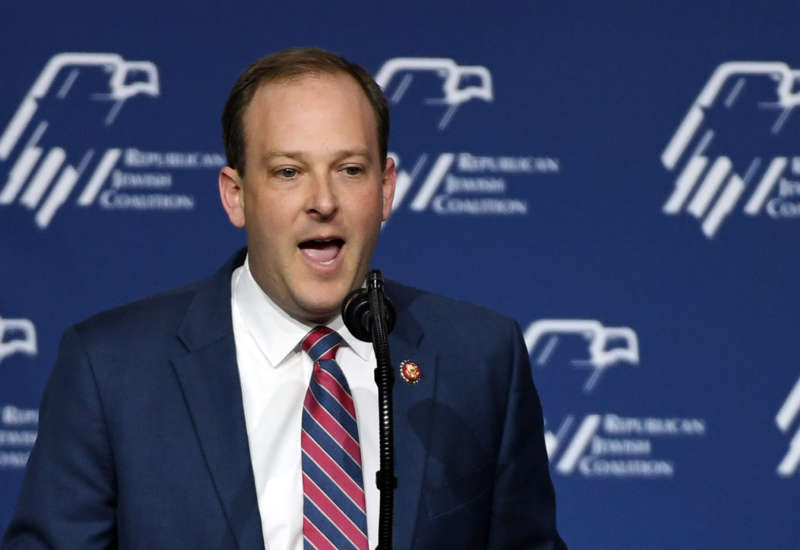The New York State Republican Party has overwhelmingly thrown its weight behind Long Island’s Lee Zeldin as its preferred candidate in the race for governor. Over the past few years, Zeldin has walked closely in lockstep with the Trumpite line, right down to refusing to acknowledge the legitimacy of the 2020 presidential election result. What does his anointment as GOP favorite in the Empire State say for whether or not the GOP can make inroads in blue states over the coming months?
The party’s primary, in which seven candidates have already announced they are competing, isn’t until June 28, which means that Congressman Zeldin — who voted against certifying Joe Biden’s election victory, who opposed the creation of a committee to investigate the January 6 insurgency, and who signed an amicus brief asking the Supreme Court to throw out the Electoral College votes cast by Georgia, Michigan, Pennsylvania and Wisconsin — will likely spend the next 15 weeks tacking hard to the right to appeal to his party’s primary voters. Zeldin has come out in favor of doubling down on U.S. fossil fuel production; opposes vaccine and mask mandates; has promised to roll back tax increases levied on wealthy New Yorkers; has pushed a “tough-on-crime” agenda that, among other things, would increase the length of time for which prisoners can be sent to solitary confinement; and has followed Glenn Youngkin’s lead in attacking public school curricula.
But he will, in this, have to walk a fine line. For, while following Donald Trump down the anti-democratic road he is carving out is popular with base voters, it’s politically toxic among the electorate as a whole in blue states such as New York.
A University of Massachusetts Amherst poll released at the end of last year found that a whopping 71 percent of Republicans doubt the legitimacy of Biden’s win. But, nationally, two-thirds of voters accept his win as being valid, and fully 44 percent hold Donald Trump personally responsible for inciting the January 6 insurrection.
While support for Trump and his nefarious theories about a stolen election may play well with GOP voters, repeating the Big Lie is unlikely to prove to be a vote-winning strategy in the general election: In New York, nearly 61 percent of the 8.61 million people who voted in 2020 cast ballots for Biden.
For Zeldin and his fellow GOP would-be-nominees, this all must be intensely frustrating. After all, the New York GOP has, over the past few months, gotten increasingly confident that it can ride voter angst on the economy, on rising crime rates, on education policy. Last month, a GOP-commissioned poll by Triton Polling Research — much-hyped by the conservative New York Post — concluded that New York’s electorate was seething about the status quo, and in particular was resentful of Democratic policy reforms such as the limiting of cash bail. And the Democrats were caught up in an intraparty clash last year, in which the state’s attorney general, Leticia James investigated, and ultimately brought down, Gov. Andrew Cuomo in a sexual harassment scandal.
Yet the Triton poll showed that, even though voters were starting to align with many of the talking points being pushed by the Republican Party, Donald Trump himself remained so unpopular and polarizing a figure in New York that it was limiting the party’s chances to make electoral inroads in the state. Indeed, in New York at the time of the last election, in November 2020, slightly under a quarter of registered voters declared themselves to be Republican, compared to more than half who identify as Democrats.
It’s a stark turnaround from the years surrounding the turn of the century, when Republicans were highly competitive in the state. From 1981-1999, one of New York’s two senators was the deeply conservative Al D’Amato. In 1994, Republican George Pataki won the governorship. Pushing tax cuts, welfare “reform” and job creation, and running on a technocratic, moderate platform, he was reelected twice, both times by large margins.
Yet, in the 15 years since Pataki’s last term ended, the state has turned more and more blue — and, at the same time, the GOP has swung further to the right, culminating in its current Trumpist incarnation.
In 2006, Eliot Spitzer won the governorship by a landslide. When Spitzer’s term was cut short by a sex scandal, he was succeeded, briefly, by Lt. Gov. David Paterson. After that came the Cuomo regnum. In 2010, 2014 and 2018, Andrew Cuomo won a troika of victories. His third term was cut short by a cascading series of sexual harassment allegations. Now, Kathy Hochul is the governor. Assuming she survives a possible primary challenge by Cuomo — who is deep into a campaign to rehabilitate himself politically — she will be far-and-away the odds-on favorite to win the general election, in a state where both houses of the legislature now have Democratic supermajorities.
If Zeldin emerges as the GOP nominee, the party will be fielding a candidate who has largely voted in lockstep with Trumpian positions in recent years on everything from opposing investments in clean energy research and providing disaster relief funds for Puerto Rico to opposing repeal of a cap in deductions for state and local taxes that was locked into place by Congress in 2017.
Zeldin opposed the impeachment inquiries into Trump’s actions with Ukraine and his role in the attempted coup of January 6. He opposed establishing baseline humanitarian standards for those being held in detention by Customs and Border Patrol. He opposed funding the federal government unless the spending bill included money for Trump’s border wall. And the list goes on.
For a state with New York’s broadly liberal political priorities, that’s an awful lot of hostages to fortune. Sure, the electorate is in an ugly and angry mood; but that doesn’t mean New Yorkers are about to turn around and embrace a dyed-in-the-wool apologist for Donald Trump.


